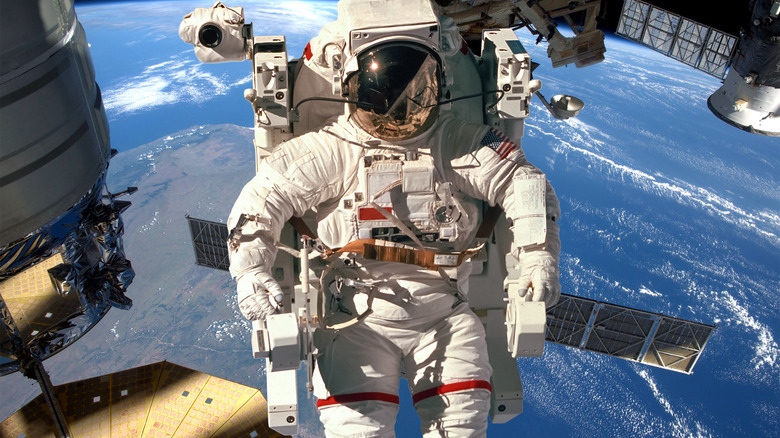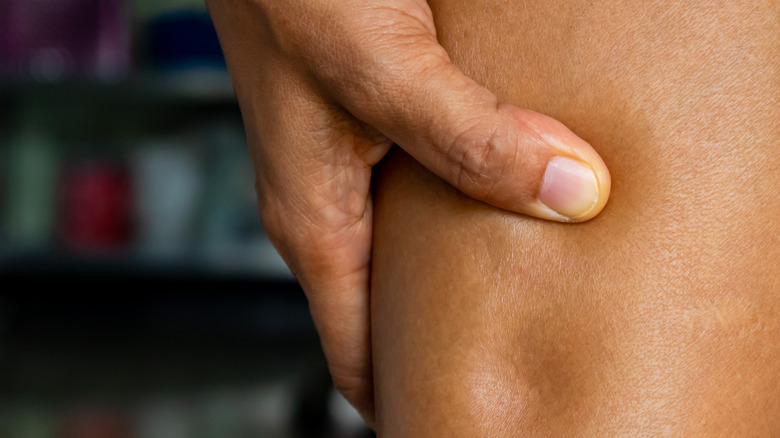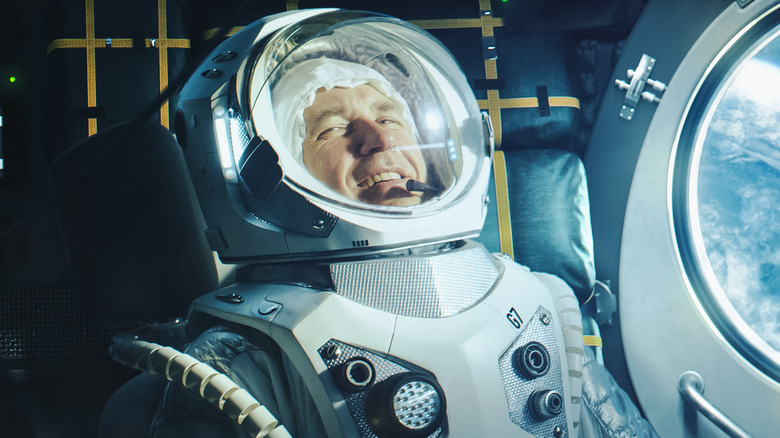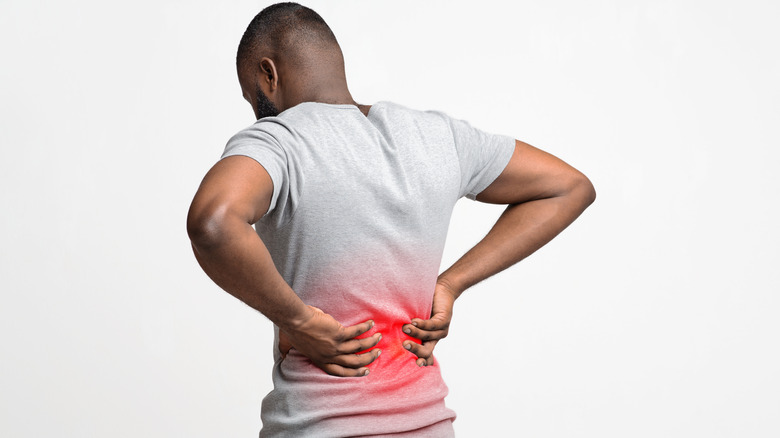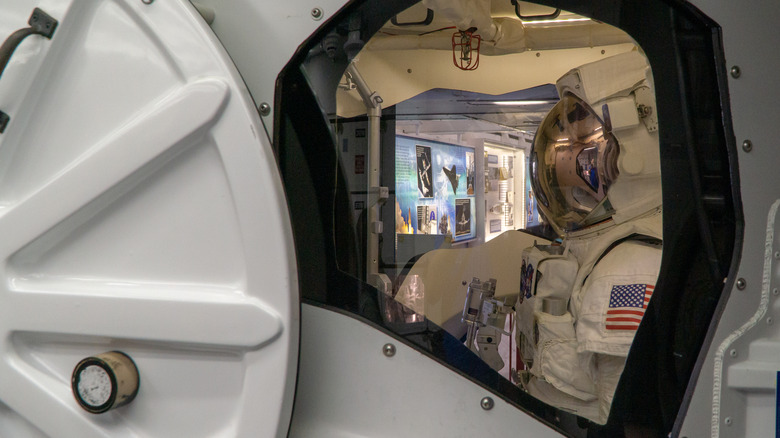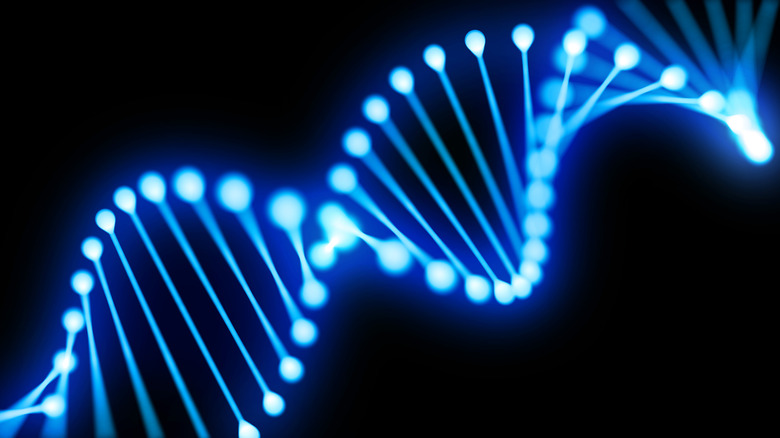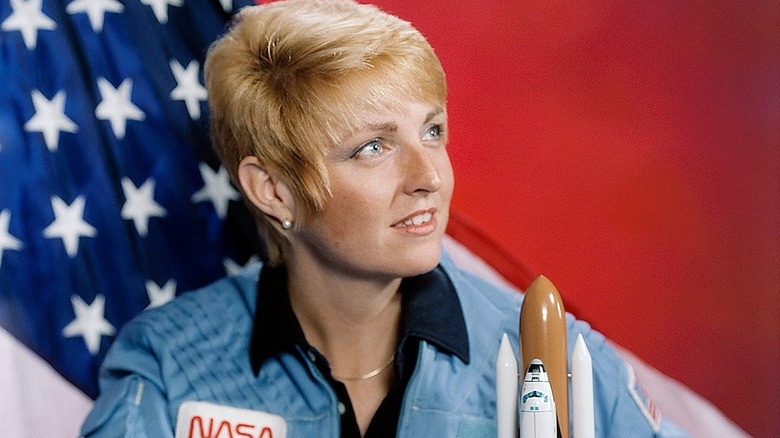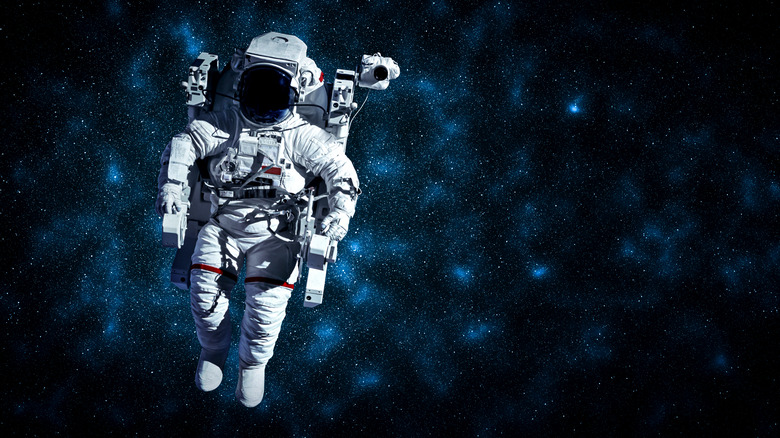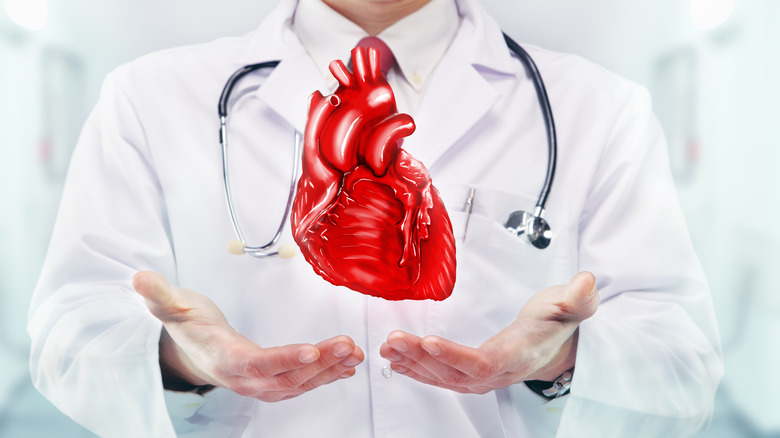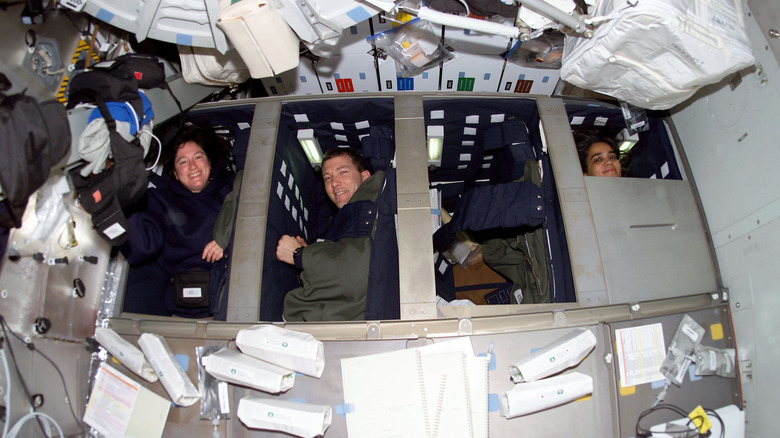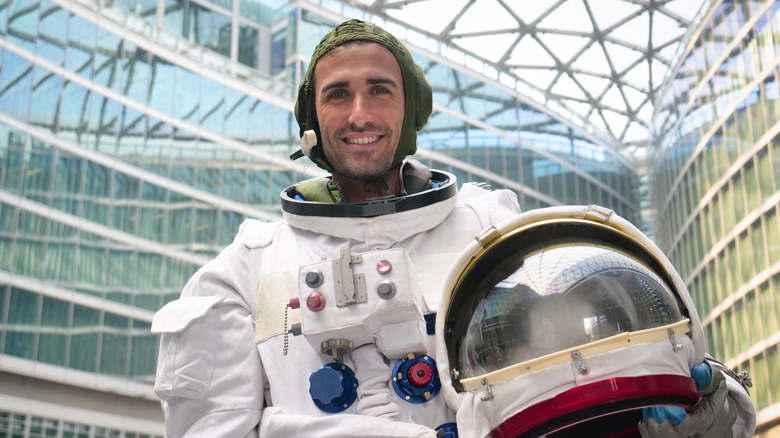What Really Happens To The Human Body In Space
On July 11, 2021, Richard Branson propelled toward space in a rocket-powered plane that had been in development for around 14 years (via The Atlantic). We say "toward" because it's debatable whether Branson truly reached "space" — defined internationally as 62 miles above sea level. Branson reached just over 50 (although that's equal to "space" in NASA's eyes).
Of course, Branson wasn't even close to the first person to reach space. That was Soviet cosmonaut Yuri Gargarin, who, on April 12, 1961, "orbited Earth at a maximum altitude of 187 miles," revealed History. Less than a month later, on May 5, 1961, American astronaut Alan Shepard became the first American to reach space (via Air and Space Museum). Since then, over 500 people have made it to space (via CBS Minnesota). This includes businessman Jeff Bezos, who flew 60 miles above sea level nine days after Branson's journey (via CNN). Some 243 people have even visited the International Space Station, which is 250 miles above sea level (via NASA).
Deaths in space are relatively rare, as we'll discuss below, but that doesn't mean that space — traveling to and from it — are not inherently dangerous. Nor does it mean that there are no long-term effects. Read on to learn what really happens to the human body in space and as a result of space travel.
The most significant and immediate risk
Of the 550 people who've rocketed into space, just three have actually died in space: Soviet cosmonauts Georgi Dobrovolski, Vladislav Volkov, and Viktor Patsayev (via Astronomy). Although the three successfully spent three weeks of June 1971 on the then-international space station, the Salyut 1, they were all found dead in their rocket upon its landing back on Earth. Their cause of death offers a window into one of space travel's most significant and immediate risks to the human body: suffocation. This is a result of the fact that space has no air and acts as a vacuum if it comes upon any air.
Investigators determined that at an altitude of 104 miles above sea level (i.e., well into what anyone would define as space), a valve on the spacecraft opened, sucking all of the air out of the cabin (this is also known as depressurization). According to Harvard University's Science in the News, someone exposed to this sudden depressurization would likely experience an overexpansion of their lungs, resulting in lung rupture and death. In addition, the liquid in the bloodstream could vaporize, circumventing circulation while causing swelling and bruising, as was noted on the bodies of the cosmonauts, who were determined to have died of suffocation. These days, astronauts must wear pressurized spacesuits even while traveling in a pressurized spacecraft.
The lack of gravity in space does a number on the distribution of the body's fluids
From many years of research that is still ongoing, NASA's Human Research Program has come up with an acronym, "RIDGE," to highlight the five hazards of space travel on the human body. These are radiation, isolation, distance (from Earth), gravity (or the lack thereof, which is known as "microgravity"), and environment (i.e., a closed environment).
While none of these words tell us precisely what happens to the human body in space, each offers its own window. For example, something that typically happens to the human body in space, even while wearing a spacesuit, is edema (the collection of an excess of bodily fluid where it does not belong), especially in the upper body and face, resulting from microgravity (via Science in the News). Specifically, astronauts are known to have to deal with "puffy face syndrome," according to the BBC. This falls under "G" for gravity.
Water makes up an enormous portion of the human body (via USGS). As babies, water makes up nearly 80%; in adults, it's more like 60 to 65%. On Earth, gravity draws fluids downward toward the lower extremities, resulting, more or less, in what has evolved into an even distribution throughout the body. In space, the absence of gravity interferes with this, causing fluids to travel upward, leading to noticeable swelling in the upper body — especially the face and head.
Space has a way of causing significant upper respiratory congestion in the human body
Something that happens to the human body in space as a result of the lack of gravity, or rather microgravity, is upper respiratory congestion, according to Science in the News. "In microgravity, there is a loss of the normal head-to-foot hydrostatic pressure gradient experienced during the upright posture on Earth, which results in a cephalad fluid shift," wrote the authors of a 2020 study published in the Journal of the American Medical Association's Otolaryngology – Head & Neck Surgery. What that means, in layman's terms, is that as a result of microgravity's failure to optimally distribute bodily fluids downward, not only will the upper body experience swelling, but one may experience a sense of upper respiratory congestion, including head pressure. Or to put it another way: Astronauts are at risk for symptoms associated with nasal and sinus congestion.
In addition, just as you might lose your sense of smell while dealing with cold symptoms or a sinus infection, astronauts often lose their sense of smell, temporarily, while in space, according to NASA. And that can lead to impairment of the sense of taste. "From the early 1960s, astronauts found that their taste buds did not seem to be as effective when they were in space," wrote NASA.
Space travel does a number on the kidneys
In space, the body is challenged to distribute bodily fluids, the levels of which are normally regulated, in part, with assistance from Earth's gravitational pull. Said gravitational pull draws fluids away from the head and toward the extremities (via Science in the News). In addition to edema, something else that can be negatively affected by spending time in microgravity is kidney health, according to the University of Wisconsin Department of Medicine (UWDM). "Certain conditions related to poor kidney health appear more rapidly in space and could have life-long consequences," kidney specialist, Dr. Jonathan Himmelfarb, told UWDM. "These include protein in the urine, bone loss, and kidney stones."
Kidney stones, most of which are comprised primarily of calcium, often present at excessively high levels in the blood of astronauts in space (via NASA). In 2001, NASA announced a mission aimed at understanding the mechanism of kidney stone development in astronauts and testing the effectiveness of potassium citrate as a "countermeasure to reduce this risk."
The human body is highly prone to nausea while in space
According to the BBC, up to 50% of all astronauts have to deal with nausea as a result of the effects on the human body due to the fact that space is lacking in gravity. This nausea is considered to be a form of "motion sickness" because it is believed to be the result of the inner ear receiving environmental signals that contradict what the eye is seeing. That is what is usually behind motion sickness in cars, and on boats and airplanes.
On Earth, gravity informs us, unconsciously, of where we are in relation to the ground and the sky, via our inner ears. Often when we experience motion sickness on Earth, we can find relief by actively using our eyes to observe the movement that the inner ears may be unconsciously registering. In space, where gravity is lacking, the inner ears receive no messages about where we are in relation to "up" and "down." At the same time, our eyes are registering what they believe to be "up" and "down." Since motion sickness occurs when the eyes are not registering what the inner ears are, motion sickness, characterized by nausea, dizziness, and headache, is one of the most common side effects of space travel. It even has a name: "Space Adaptation Syndrome" (SAS), according to The Mars Generation. Fortunately, this phenomenon is not known to last once a space traveler touches back down on Earth.
Lack of gravity has an impact on the eyes
Another risk of space travel is vision impairment, according to Harvard University's Science in the News. Unlike some of the other things that happen to the human body in space, this one can be permanent, National Geographic revealed. One reason is microgravity's failure to distribute the body's fluids optimally. On Earth, gravity helps make sure that enough fluid is distributed to the lower body, whereas in space, that cannot happen.
This can lead to an irreversible flattening of the eyeball and damage to the optic nerve, as was first observed in astronaut John Phillips in 2005 after six months in space. This phenomenon has come to be known as "Space-Associated Neuro-Ocular Syndrome" (SANS), according to NASA. SANS has been observed in around 70% of space travelers, to varying degrees, and is often exacerbated with extended stays in space.
Another reason for space-related vision impairment is that the human body is closer to the sun while in space than it is on Earth and does not have the benefit of the Earth's atmosphere to filter the sun's UV radiation, which is known to cause damage to the eyes. Other factors may be elevated levels of carbon dioxide and the effects of radiation, in general, which can and has been known to damage the human body's DNA — right down to permanently altering one's genes (via BBC).
Space can alter a person's DNA
During the year that astronaut Scott Kelly spent in space, his health was deemed to have remained "good" overall, but his time spent above the Earth was nevertheless found to have changed his DNA. Further, it was found to have done so permanently with regard to about 7% of his genes, according to USA Today. The changes to Kelly's DNA, now known popularly as "space genes," were observable largely at the microscopic level, although some were observable at the clinical level, including damage to Kelly's eyes and a thickening of his carotid artery (via Time). Other notable genes that were altered in Kelly were said to relate to his "immune system, DNA repair and bone formation networks, among other bodily functions," revealed USA Today.
Researchers rated the level of change as that which would be consistent with humans under stresses such as mountain climbing or SCUBA diving. However, the takeaway here appears to be that the stresses to the human body that result from various hazards of spaceflight such as radiation, gravity, and closed environment (via NASA) appear to cause inflammation in the body as well as other symptoms of stress, which, in turn, affect gene expression, as a 2017 study highlighted.
The immune system takes a hit
Since the days of the early Apollo missions, scientists have been aware that space travel can alter the body's immune system, and not necessarily for the better, explained the University of California at San Francisco. "Some astronauts have even experienced re-activation of dormant viruses, such as the chickenpox virus," UCSF revealed.
For many decades, the blame has been placed largely on the effects of space's relative lack of gravity. "Microgravity," as it is known, can cause fundamental changes, some temporary, some permanent, in the way the body functions and how it responds to stresses and perceived threats (via InTech Open). It can also cause changes to a lesser extent on the closed environment inherent in space travel, resulting in increased exposure to the same microbes from the same sources, without an opportunity for one's microbiome to build and change strategically (via Time).
In a 2021 study published in Scientific Reports, however, scientists have pinpointed a more specific reason, which is that space travel causes T regulator immune cells to activate abnormally. That study, out of UCSF and Stanford University, focused on the immune system and health of Millie Hughes-Fulford, the "first female payload specialist to orbit Earth" and who died of leukemia in February 2021.
A human body may experience a decrease in muscle mass as a result of space travel
Astronaut Scott Kelly reported that upon his return to Earth, he experienced some of the symptoms of muscle loss, including soreness, stiffness, and weakness. In fact, it has long been known that the human body is at risk for losing muscle mass during and as a result of space travel, and especially extended space travel.
An older study published in the FASEB Journal addressed the issue of "skeletal muscle atrophy" resulting from space travel. This is known to be caused by either the relative lack of gravity and by the reality of limited room in which to move around while in space. The less gravitational force that is present on the body and its muscles and bones, the less hard the body has to work in order to move itself. So, even though an astronaut may be getting regular exercise on a daily basis, they may experience muscle atrophy similar to that experienced by people on extended bed rest.
To combat potential muscle loss, astronauts are required to exercise for two or more hours per day, according to the BBC — and not just some gentle yoga or a jaunt on the treadmill. Rather, scientists have come up with "odd-looking contraptions" designed to increase the work that the body must do when exercising in microgravity (via BBC).
Bone mass decreases
Closely related to the fact that space travel may cause a loss of muscle mass is that bone mass may also suffer. First, bones benefit just as muscles do from regular weight-bearing exercise, according to Healthline, the opportunities for which are lacking in space. To the extent that microgravity makes the body not work as hard to move itself in space, the skeletal system suffers along with the muscular system. In addition, it has been noted that human bones may experience chemical changes in space that contribute to measurable bone loss, according to NASA. The organization pointed out that for every month spent in "zero gravity," an astronaut will lose 2% of their bone mass, on average. However, the precise mechanism for this is still unknown. What is known and easily observed is that as a result of being in space, the bones lose calcium, which is broken down and released into the bloodstream — with the blood showing a marked increase in calcium levels.
Space-related bone loss begins almost immediately, according to NASA, with "the most severe loss" occurring "between the second and fifth months in space, although the process continues throughout the entire time spent in microgravity." In some of the worst cases, scientists have observed astronauts who have lost as much as 20% of their pre-space bone mass. Fortunately, most of this loss can be regained upon return to Earth.
The human heart changes shape in space
The lack of gravity present in space can negatively impact the human heart, according to NASA, which explained that "the cardiovascular system that includes both the heart and blood vessels has evolved to operate in Earth's gravity while standing, sitting or lying down. Daily physical activity while working or exercising against gravity keeps everything flowing smoothly." However, changes to the heart that may occur as a result of space travel are not limited necessarily to those caused by fluid shifts.
"In microgravity the heart changes it shape from an oval (like a water-filled balloon) to a round ball (an air-filled balloon)," NASA noted. In addition, the heart is a muscle and is therefore subject to the same atrophy as one's glutes and deltoids. As a result, a heart that has spent time in space may not be capable of optimally controlling blood flow through the circulatory system. As of this writing, research is being conducted at the International Space Station to learn more about the way that being in space may affect the human heart and to develop "countermeasures to the many possible different cardiovascular changes."
Sleeping well in space is not likely
Everyone knows the importance of getting enough good quality sleep, and this is no less relevant in space than it is on Earth, according to a 2018 study published in the journal of Military Medical Research. "Sleep problems could impair the work performance and health of crewmembers which could ultimately influence the safety of [space] flight missions," the study authors wrote. The factors that cause sleep disruption in space are many and can be categorized into several of the five general hazards associated with space travel, namely gravity (and the lack thereof), closed environment, and isolation.
Being subjected to microgravity over an extended period, for example, can directly interfere with the optimal distribution of body fluids, which can, in turn, lead to a number of problems that can impact sleep, such as congestion and pain such as headaches (via Science in the News). With regard to closed environment, some astronauts report difficulty sleeping as a direct result of uncomfortable room temperature and high noise levels. Isolation can contribute by raising or exacerbating existing psychological or behavioral issues that interfere with normal sleep hygiene.
In addition, space features a complete absence of "circadian clues" such as the rise and setting of the sun, that would otherwise contribute to a healthy functioning body clock, according to the 2018 study. The authors also noted that "circadian rhythm disorder may be an important cause of orbital sleep disturbance to astronauts."
What effect does space have on the way the human body ages?
Some changes that can happen as a result of going up into space are similar to changes that occur naturally as the human body and its cells age (e.g., vision impairment, kidney stones). So it probably won't be all that surprising to learn that people in space seem to experience aging at a faster rate than people on Earth, according to NMN. That said, some research suggests that flying through space could actually slow the aging process, according to The Conversation.
For example, when astronaut Scott Kelly spent a year in space, it was observed by researchers studying him, that some of his chromosomal "telomeres," which naturally shorten as we age, had grown longer by the end of his year in space. However, upon Kelly's return to Earth, those telomeres shortened rapidly, but ultimately stabilized to "near pre-flight averages." And yet "from the perspective of aging and risk of disease," Kelly still ended up with more short telomeres after traveling through space than what he started out with.
Science has yet been able to provide a definitive answer to the question of whether space travel can slow or even potentially reverse the course of aging, or whether it will turn out that the opposite is true. What is known is that as much as space travel is associated with various bodily changes that could be considered life-shortening, a 2018 study demonstrated that space-traveling astronauts may actually live longer than the general population (via FirstPost).

